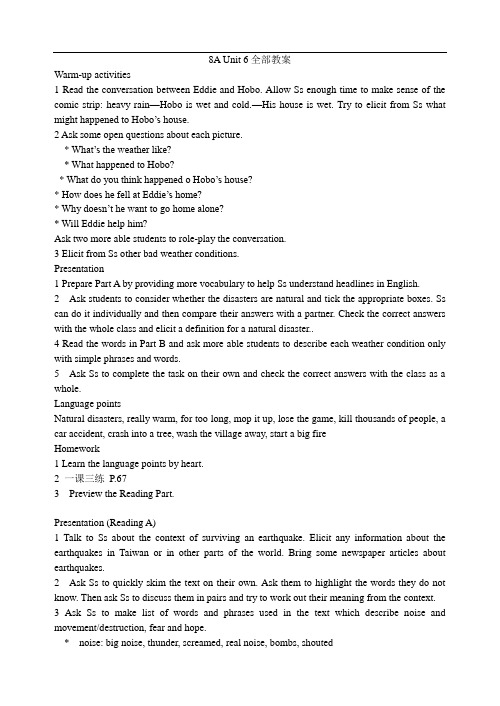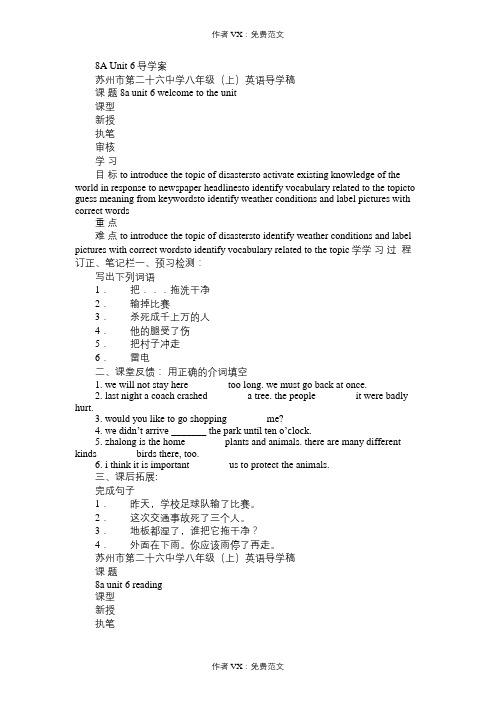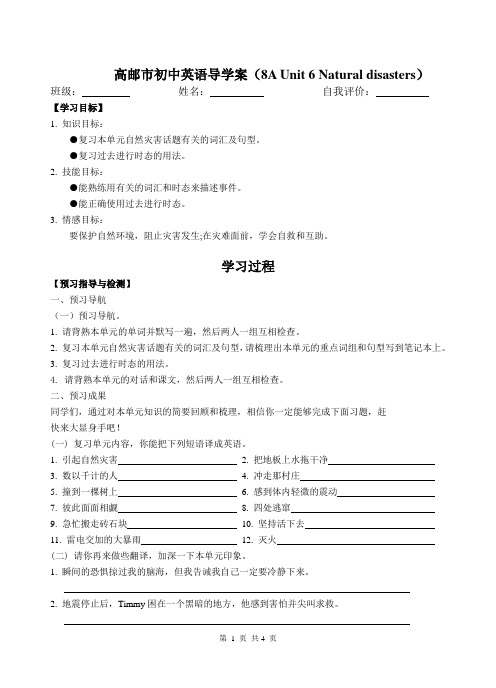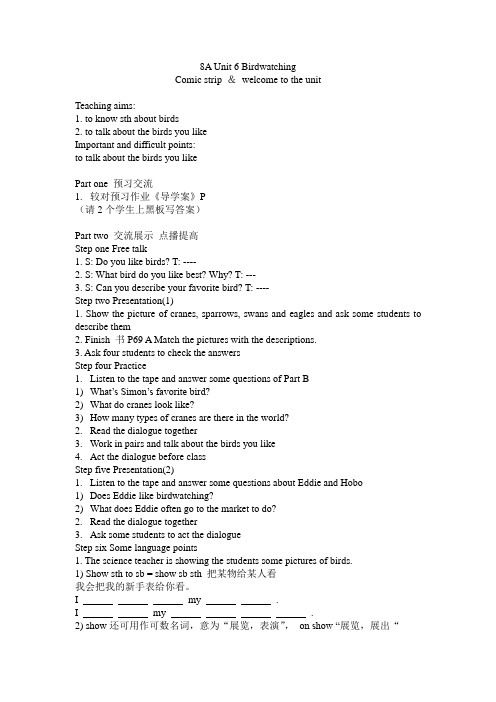8Aunit6学案
8A Unit6教案全部

8A Unit 6全部教案Warm-up activities1 Read the conversation between Eddie and Hobo. Allow Ss enough time to make sense of the comic strip: heavy rain—Hobo is wet and cold.—His house is wet. Try to elicit from Ss what might happened to Hobo’s house.2 Ask some open questions about each picture.* What’s the weather like?* What happened to Hobo?* What do you think happened o Hobo’s house?* How does he fell at Eddie’s home?* Why doesn’t he want to go home alone?* Will Eddie help him?Ask two more able students to role-play the conversation.3 Elicit from Ss other bad weather conditions.Presentation1 Prepare Part A by providing more vocabulary to help Ss understand headlines in English.2 Ask students to consider whether the disasters are natural and tick the appropriate boxes. Ss can do it individually and then compare their answers with a partner. Check the correct answers with the whole class and elicit a definition for a natural disaster..4 Read the words in Part B and ask more able students to describe each weather condition only with simple phrases and words.5 Ask Ss to complete the task on their own and check the correct answers with the class as a whole.Language pointsNatural disasters, really warm, for too long, mop it up, lose the game, kill thousands of people, a car accident, crash into a tree, wash the village away, start a big fireHomework1 Learn the language points by heart.2 一课三练P.673 Preview the Reading Part.Presentation (Reading A)1 Talk to Ss about the context of surviving an earthquake. Elicit any information about the earthquakes in Taiwan or in other parts of the world. Bring some newspaper articles about earthquakes.2 Ask Ss to quickly skim the text on their own. Ask them to highlight the words they do not know. Then ask Ss to discuss them in pairs and try to work out their meaning from the context.3 Ask Ss to make list of words and phrases used in the text which describe noise and movement/destruction, fear and hope.* noise: big noise, thunder, screamed, real noise, bombs, shouted* movement/destruction: slight shaking, earth started to shake, ran (wildly), pieces of glass and bricks fell down, walls began to come down* fear: screamed, frightened, dark, could not at all, a moment of fear* hope: calm down, still alive, bright daylight, safe4 Read Timmy’s story aloud. Ask Ss to listen carefully.5 Check general understanding of the different paragraphs by asking some ‘ wh-‘ questions. Para 1: Where was Timmy?What happened in the shopping centre?Para 2: What happened to the building?How did people react?What did Timmy do?Para 3: Where was Timmy when the shaking stopped?How did Timmy feel?Para 4: What did Timmy do while he was waiting for help?Para 5: How was he rescued?Presentation (Reading B)1 Explain the context of Part B. Ask students to do Part B1 on their own. Encourage students to check their answer with a partner.3 Ask students to study the words in the box for one minute, then cover them and complete the diary entry in Part B2.Presentation (Reading C)1 Explain the context and point out to Ss the idea of telling a story with pictures. Divide the class into teams of 4-5 students to study each picture first.2 Ss write the captions in the blanks individually. Check answers with the whole class.3 Ask Ss to arrange the pictures in the right order.Presentation (Reading D)1 Explain the context and remind them about story telling from memory. Ss work in pairs to complete the task.2 Check the answers with the whole class.Language points (Part A)Feel a slight shaking through my body, a big noise like thunder, in fear, be frightened, start to shake, run in all directions, know where to go, run wildly, fall down, calm down, be over, could not see at all, be trapped, say to oneself, a moment of fear, go through my mind, since, hear excited shouts, in a great hurry, move away, see the bright daylight.Language points (Part C)Be very good at telling jokes, voteHomework1 Learn the language points by heart.2 一课三练P.68-693Preview the V ocabulary Part.当前中学英语课堂教学存在的主要问题及对策林会猛[ 摘要] :中学英语课堂教学是提高教学质量的关键。
8A-Unit6复习学案(已校对)

8 6 ( )复习案实验学校: 马和芳一、词汇背诵1(.)(n.)2(v.)—(过去式)—(n.)3(.) ()4()5(n.)(v.)6 (n.)(v)7(n.)—(v.)8()——–(.)9.10(.)(.)11(.)——– (.)12—13(v)—(.)14(v)—15(v.)——1617(v)持续()最后的,上一个的1 / 151819() ()其它四会单词二、复习要点1 自然灾难.大自然的n.灾祸(可数名词).其名词形式为,大自然2 . ’s ’t ?地板全湿了。
如果你不跟我来谁把地板拖干?湿透了 . 我的手全弄湿了。
3. . 直到半小时后。
才。
(1)本句完整句子是I ’t .(2)……意为“直到……才”,常与短暂性动词连用。
(3)用于肯定句,表示”……到”,常与延续性动词连用’s . 他们直到男孩的母亲回来才离开。
2 / 15’s . 他们一直等到男孩的母亲回来。
4 . 台湾大地震使成千上万的人丧命。
“成千上万的” . 有成千上万的人在这里。
[注] 同类归纳, 与的用法①当这些词与具体的数字连用时,通常不加. 200名学生去了那里。
②当这些词不与具体的数字连用,而是表示不确定的泛指数时,则不仅要加,而且要后接介词,然后才能接名词。
. 数千名学生参加了这次考试。
5. A . 3个男人在一起汽车车祸中丧生。
n.事故、意外的事a / a 一场交通事故表示“出意外”?昨晚你出了什么事?.我出了点意外。
6. A .一场洪水卷走了村庄。
冲走,冲掉[注] 如果代词做宾语时,须放在中间7 , I a .起初,我感到一阵轻微的颤抖传遍我的全身。
n.摇动(动词形式)用的适当形式填空3 / 15(1) .(2) ?: 介词,“穿过,通过,透过”(1) I .(2) .8. . 人们惊恐地互相注视着。
n.害怕、恐惧害怕类似短语:9. . 人们到处奔跑,n. 方向在各个方向(1) . 小鸟正朝四处飞去。
(2) , .10. .当玻璃碎片和砖块落下来时,人们慌乱地跑着。
【51】牛津英语8A_Unit6复习学案

牛津初中英语8A Unit6 复习学案复习目标1、掌握四会单词2、重点短语的灵活运用3、语法○1过去进行时态○2while / when的不同用法4、通过话题作文复习重点句型教学流程一、四会单词natural disaster accident shaking direction wildly calm mind hurry loudly wind fog weather temperature drop discuss project terrible serious situation nearly二、短语1、自然灾害2、把……拖干净3、数千人4、撞到树上5、冲走6、害怕地,恐惧地7、四处8、镇定下来9、从……跑出来10、赶快,急忙11、移走12、尽力13、跌倒,摔倒14、感到害怕15、天气预报三、词汇A)用所给动词的正确形式填空be over, turn on, calm down, as if, at last1、I told myself ____ before going into the teachers’ office.2、The meeting started at 2:00 p.m and ____ at 5:00 p.m.3、The thief tried to run away, but the policeman caught him ____.4、The girl’s eyes are red ____ she cried just now.5、Please ____ the light. It’s too dark in the room.B) 用所给单词的正确形式填空1、It is a ____(sun) day.2、It was ____(fog) yesterday. We couldn’t see each other in one metre.3、They ____(not be) at school because of the bad weather yesterday.4、Our teacher often tells us ____(not play) computer games.5、When Simon arrived, we ____(do) our homework.C) 根据句意和中文提示,写出句中所缺单词1、The sports meeting ____(持续) three hours yesterday.2、Do you know water ____(覆盖) the most part of the earth?3、Don’t worry about your mother. It’s nothing ____(严重的).4、My uncle is a ____(士兵) and my aunt is an English teacher.5、Many people lost their lives in the ____(事故).四、语法A) 用所给动词的适当形式填空1、What ____ you ____(do) at noon yesterday?2、I ____(watch) TV when my mother ____(come) in.3、He ____(do) his homework at ten yesterday afternoon.4、The children ____(play) football at four yesterday morning.5、The baby ____(sleep) when he mother come back.B) 用when和while填空1、____ Peter tears his book, Mary is having lunch.Peter tears his book ____ Mary is having lunch.2、____ Jenny was in form one, her brother went to the USA.Jenny was in form one ____ her brother went to the USA.3、____ the teacher was teaching, the students were listening.The teacher was teaching ____ the students were listening.4、____ Jack is watching television, his mother finishes her dinner.Jack is watching television ____ his mother finishes her dinner.五、书面表达Jim的家中失了一次火,请根据下列提示写一篇短文,对事故的经过做一个介绍:1、3月8日上午Jim家的房子被闪电击中着火了2、Jim及他的父母被困在家中3、他父亲的左手受伤了4、Jim上午8:30打了110热线,警察5分钟后到,并把他们送到医院。
八年级英语教案8AUnit6导学案

8A Unit 6导学案苏州市第二十六中学八年级(上)英语导学稿课题8a unit 6 welcome to the unit课型新授执笔审核学习目标 to introduce the topic of disastersto activate existing knowledge of the world in response to newspaper headlinesto identify vocabulary related to the topicto guess meaning from keywordsto identify weather conditions and label pictures with correct words重点难点to introduce the topic of disastersto identify weather conditions and label pictures with correct wordsto identify vocabulary related to the topic学学习过程订正、笔记栏一、预习检测:写出下列词语1.把...拖洗干净____________2.输掉比赛____________3.杀死成千上万的人____________4.他的腿受了伤____________5.把村子冲走____________6.雷电____________二、课堂反馈:用正确的介词填空1. we will not stay here _______ too long. we must go back at once.2. last night a coach crashed _______ a tree. the people _______ it were badly hurt.3. would you like to go shopping _______ me?4. we didn’t arrive _______ the park until ten o’clock.5. zhalong is the home _______ plants and animals. there are many different kinds _______ birds there, too.6. i think it is important _______ us to protect the animals.三、课后拓展:完成句子1.昨天,学校足球队输了比赛。
8A Unit6 复习导学案

高邮市初中英语导学案(8A Unit 6 Natural disasters)班级:姓名:自我评价:【学习目标】1. 知识目标:●复习本单元自然灾害话题有关的词汇及句型。
●复习过去进行时态的用法。
2. 技能目标:●能熟练用有关的词汇和时态来描述事件。
●能正确使用过去进行时态。
3. 情感目标:要保护自然环境,阻止灾害发生;在灾难面前,学会自救和互助。
学习过程【预习指导与检测】一、预习导航(一)预习导航。
1. 请背熟本单元的单词并默写一遍,然后两人一组互相检查。
2. 复习本单元自然灾害话题有关的词汇及句型,请梳理出本单元的重点词组和句型写到笔记本上。
3. 复习过去进行时态的用法。
4.请背熟本单元的对话和课文,然后两人一组互相检查。
二、预习成果同学们,通过对本单元知识的简要回顾和梳理,相信你一定能够完成下面习题,赶快来大显身手吧!(一) 复习单元内容,你能把下列短语译成英语。
1. 引起自然灾害2. 把地板上水拖干净3. 数以千计的人4. 冲走那村庄5. 撞到一棵树上6. 感到体内轻微的震动7. 彼此面面相觑8. 四处逃窜9. 急忙搬走砖石块10. 坚持活下去11. 雷电交加的大暴雨12. 灭火(二)请你再来做些翻译,加深一下本单元印象。
1. 瞬间的恐惧掠过我的脑海,但我告诫我自己一定要冷静下来。
2. 地震停止后,Timmy困在一个黑暗的地方,他感到害怕并尖叫求救。
3. 当我突然听见我上面的吵闹声时,我正尽力找出路。
4. 就在一块块玻璃和砖块落下时,人们在疯狂奔跑。
5. 由于雷电击中,他们的学校着火了。
6. 天气报告说明天气温将下降到-5℃。
(三)同学们, 在完成上面练习以后你对本单元还有什么不够理解的地方,请写下来。
__________________________________________________________________________【课堂导学与互动】活动一:听P94-95的录音并能跟读。
8AUnit6P1导学案

8A Unit 6 BirdwatchingComic strip &welcome to the unitTeaching aims:1. to know sth about birds2. to talk about the birds you likeImportant and difficult points:to talk about the birds you likePart one 预习交流1.较对预习作业《导学案》P(请2个学生上黑板写答案)Part two 交流展示点播提高Step one Free talk1. S: Do you like birds? T: ----2. S: What bird do you like best? Why? T: ---3. S: Can you describe your favorite bird? T: ----Step two Presentation(1)1. Show the picture of cranes, sparrows, swans and eagles and ask some students to describe them2. Finish 书P69 A Match the pictures with the descriptions.3. Ask four students to check the answersStep four Practice1.Listen to the tape and answer some questions of Part B1)What’s Simon’s favorite bird?2)What do cranes look like?3)How many types of cranes are there in the world?2.Read the dialogue together3.Work in pairs and talk about the birds you like4.Act the dialogue before classStep five Presentation(2)1.Listen to the tape and answer some questions about Eddie and Hobo1)Does Eddie like birdwatching?2)What does Eddie often go to the market to do?2.Read the dialogue together3.Ask some students to act the dialogueStep six Some language points1. The science teacher is showing the students some pictures of birds.1) Show sth to sb = show sb sth 把某物给某人看我会把我的新手表给你看。
8Aunit6 教学设计
ask three students to read the text and explain the language points.
T: Which phrases and sentences are important do you think?
Which sentences are difficult do you think?
3.To know how to protect endangered birds..
教学重点、难点
教学重点:阅读内容中的知识点和句型表达
教学难点:灵活运用课堂所学知识点和句型和谈论扎龙自然保护区。
教学过程
Procedure
Time
Step1吸引注意,积累语言
5mins
Step 2回忆相关知识,初步运用结构
20mins
Teacher’s activities
Learners’activities
Purpose
Step 3引发期待行为,强化结构
10mins
Revision
T.We have learned much about Zhalong.
How much do you remember them?
通过读说练习形式进一步强化所学语言结构,活跃课堂气氛。
Make an interview in pairs to talk about Zhalong and how to protect endangered birds.
Homework
1 .write an article about how to protect wildlife.
Ss read the text carefully.
牛津初中英语8A八上Unit6基础课时练习学案
牛津初中英语8A八上Unit6基础课时练习学案课题:Unit6 Welcome to the unit一、根据提示,完成单词。
1. A sparrow is small in size. It has brown and grey ___________. (羽毛)2. That kind of bird is a __________ bird. We should protect them. (稀有的)3. Birds cannot fly high without ____________. (翅膀)4. Golden eagles have ____________ (宽的) wings.5. My grandparents raise(饲养)their h__________because they lay many eggs every spring.6. I have five___________ of books on my shelf. (type)7. A crane __________ over our house an hour ago. (fly)8. This Sunday our class will go ______________ to Zhalong. (birdwatch)二、单项选择。
( ) 1. ---What does your mother want to buy __________the market?--- Some meat and fish.A. atB. toC. onD. for( ) 2. --- What are you going to do? --- I am __________.A. go birdwatchingB. going birdwatchingC. going to birdwatchingD. go to birdwatching( ) 3. __________ have white feathers and long thin necks.A. SparrowsB. ParrotsC. SwansD. Eagles( ) 4. --- Which animal do you like __________ of all?--- Snakes. They are very dangerous.A. betterB. bestC. lessD. least( ) 5. ---__________? ---It’s kind of scaring(可怕的)。
人教英语八年级上册Unit6 复习学案
Unit6 Book8A导学案班级:__________ 姓名:___________一、学习目标1.记住并会运用Unit6 Book8A的重点词汇及短语;2.熟练运用be going to谈论自己与他人未来想从事的职业及原因。
二、知识点复习(一)词汇(职业的英文表达)(1)improve (2)promise(3)resolution (4)engineer(5)medicine (6)violinist(7)college (8)pilot(9)pianist (10)foreign(11)scientist (12)hobby小结:+______:worker singer _____________________________writer driver _________________________ _______末尾辅音字母: runner ______________________+______:visitor inventor _________________________+______:violinist tourist _________________________+______:actress waitress(二)短语(1)与......有关(2) make promises(3) h ave … in common(4) 写下(5) for this reason (6) 学着做;开始做(7) 能够;会(8) at the beginning of(9) make the soccer team (10) get good grades(三)be going to结构* be (am, is, are) going to + 动词原形: 一般将来时的一种表达方式*表示事先打算做的事或预测要发生的事情*肯定句:主语+ be (am, is, are) + going to + 动词原形+ 其他我打算和Kobe打篮球。
牛津英语8A_Unit6复习学案
牛津英语8A Unit6 复习学案复习目标1、掌握四会单词、重点短语和句子2、语法○1过去进行时态○2while / when的不同用法一、四会单词natural disaster accident shaking direction wildlycalm mind hurry loudly wind fogweather temperature drop discuss project terrible serious situation nearly二、短语1. 自然灾害2. 用拖把拖干净3. 成千上万的人4. 一场汽车事故5. 撞毁6. 把村庄冲走7. 引起一场大火8. 从树上掉下来9. 感到有点颤动10. 听到像雷一样的声音11. 害怕12. 开始晃动13. 四处乱跑14. 尽某人的努力做某事15. 疯狂地跑16. 掉下17. 镇静下来18. 被困19. 自言自语20. 大声喊救命21. 活着22. 一包巧克力23. 急匆匆做某事24. 最后25. 移开26. 在地震中幸免于难27. 降至零下3度28. 计划去唐山旅行29. 抛锚,坏了30. 听到从我上面传来的声音31. 覆盖整个地面32. 感到又冷又害怕33. 报警34. 给我发电子邮件35. 持续很长时间36. 着火37. 向前跌倒38. 第二天早晨39. 把雪清除40. 给当地的人分发食物和饮用水三、语法(一)过去进行时1. 过去进行时主要表示:①在过去某一时刻正在进行的动作I was writing a letter at this time yesterday .②在过去某一阶段一直在进行的动作They were building a dam last winter .From 1983 to 1998 , he was teaching at Y ale .2. 过去进行时的句式(1)基本结构:was/were + verb-ing(2)否定式:was/were not + verb-ing(3)疑问句:将was/were 放在主语前3. 常见的时间状语at this time yesterday, at that time, at nine yesterday morning, the wholeafternoon, from 6:00 to 8:00 yesterday morning,……(二)while和when1. 连词while 与过去进行时当两个延续性动词同时进行时,我们可以在两个句子中都用过去进行时,并用while 连接。
- 1、下载文档前请自行甄别文档内容的完整性,平台不提供额外的编辑、内容补充、找答案等附加服务。
- 2、"仅部分预览"的文档,不可在线预览部分如存在完整性等问题,可反馈申请退款(可完整预览的文档不适用该条件!)。
- 3、如文档侵犯您的权益,请联系客服反馈,我们会尽快为您处理(人工客服工作时间:9:00-18:30)。
知识点回顾:1.把它拖干净mop it up (mopping)2.自然灾害natur al disasters2半小时后half an hour later/after half an hour3.袭入脑海go through one’s mind4.匆忙做某事in a (great) hurry to do sth.=hurry to do sth.5. 下降到…. drop to6.除了做……别无他法could do nothing but do sth.7.把…..冲走wash …awa y8.成千上万thousands of9.撞到…..上crash into10.一阵轻微的震动a slight shaking through my body11.惊恐的对视look at each other in fear12.超四面八方跑run in all directions13.从……里跑出来run out of….14.当玻璃砖块落下的时候疯狂的跑run wild ly as pieces of glass and brick s fall down15.倒下/落下come/fall down16.平静/镇静下来calm down17.片刻恐惧袭入脑海A moment of fear goes through my mind.18.大声呼救shout /scream for help找到出路find one’s way out19.匆忙in a great hurry20.搬开/移开move away21.编借口/找理由make excuse s22.失火catch fire23. 摔倒fall over24.迷路lose one’s way25.从…..往外看look out of…26.输了比赛lose the game/match27. 一声巨响a big noise28.从树上掉下来fall from a tree29.匆忙去做某事be in a hurry to do sth.30.上网搜索search on the Internet31.与某人讨论某事discuss sth. with sb.32.开车送某人去上学drive sb. to school34.分发食物give out food/give food out35.燃起一场大火start a big fire36.暴风雪警报snowstorm warn ing37.损坏/出毛病break down38.到达时间time of arriv al39.在地下under the ground40.天气预报weather report41.覆盖了整个路面cover the whole road42.清洁的饮用水clean drink ing water43.还活着stay a live44.很长一段时间for a long time45.一阵大风a strong wind句子1.起初,我感觉有轻微的震动。
At first, I felt a slight shak ing through my body.2.后来,我听到一声巨响就像打雷一样。
Then I heard a loud noise like thunder.3.购物中心的人们惊恐的对视着。
People in the shopping centre looked at each other in fear.4.一些人因惊恐而尖叫起来。
Some people screamed because they were very frighten ed.5.人们四处逃散。
People ran in all directions.6.我竭尽全力跑到街上。
I tried my best to run out to the street.7.当砖头石块落下的时候人们疯狂的逃散。
People were running wildly while pieces of glass and bricks were falling down.8.我什么也看不见也不知道身边是否有人。
I could not see anything at all and did not know if anyone was around me.9.我的脑中掠过一阵恐惧,但我告诉自己要镇定下来,因为我仍然还活着。
A moment of fear went through my mind but I told myself to calm down since I was still alive.10.他们急忙搬开石头和砖块。
They were in a great hurry to move away the bricks and stones.11.然后我听到激动的人群的叫喊声。
Then I heard shout s from excit ed people.12.一阵劲风从身后袭来。
A strong wind came from behind.13.我往窗外望去看见人们正努力地清除积雪。
I looked out of the window and saw that people were working hard to remove the snow.14.真正的声音传来了,就像地下的炸弹。
The real noise came, like bombs under the ground.15.我正在努力找出路突然听到上面有响声。
I was trying to find my way out when I suddenly heard some noise above me.16.我告诉自己必须活下去。
I told myself that I must stay alive.17.气温将降到零下五度。
The temperature will drop to -5℃.18.多么可怕的一场暴风雪!What a terrible snowstorm!19.下了一场暴风雨又打雷又闪电。
There was a heavy storm with thunder and lightning.20.由于是假期,学校没有人。
As it was a holiday, no one was at school.21.闪电引起一间房屋燃起了大火。
Lightning started a big fire in a house. 22.现在我知道恶劣的天气可能会带来危险。
Now I know that bad weather can be dangerous.Grammar:过去进行时1.结构was/were +Ving2.肯定句,否定句,一般疑问句和回答3.用法A.表示过去某一时刻正在进行的动作。
E.g. What were you doing at 10p.m. yesterday?B.表示过去某一时间段内持续进行的动作。
时间词有:this morning, all day yesterday, the whole morning, from nine to ten last evening e.g. We were watching TV from seven to nine last night.C.表示按计划,安排等过去将要发生的事。
这种用法中动词常表示位置的转移,如:come, go , leave, start, arrive He told me that he was leaving soon.D.与always等词连用,表示某种感情色彩。
E.g. The girl was always changing her mind.(表示不满)1.I ___(read) at 9.00 last night. What ___you____(do) at that time?2.My mother ___(cook) when I ___(arrive) home yesterday.3.The boys ___(clean) the windows while the girls___(mop) the floor the whole morning yesterday.4.When the boy ___(see) his mother , he___(stop) crying.5.The meeting ___(begin) at 3.00pm yesterday.6.When the teacher ___(come) in , the students___(read) English.7.Father ___still____(sleep) when I __(get) up yesterday morning.8.Mr Black’s car ___(crash) into a big tree while he___(chat) with his friend on the phone.二.when, while在过去进行时态中的应用:1.两个在过去同时发生的动作,如果都有延续性,则通常都用过去进行时,连词用while。
I was cooking supper while he was playing the piano.2.如果在过去某个延续性动作正在发生的过程中,另一瞬间性动作发生了,那么这个延续性动作用过去进行时,如果它做从句,一般用while引导;那个瞬间动词用一般过去时,如果它做从句则用when引导。
The teacher came in while the students were talking noisily.=The students were talking noisily when the teacher came in.3.如果when或while引导的从句放在句首,则用逗号与后文隔开。
所以上面的句子也可改写成:While the students were talking noisily, the teahcer came in.=When the teacher came in, the students were talking noisily .用所给动词的适当形式填空及when或while填空1.She ____(have) breakfast ___the doorbell___(ring).2.It ___(start) to rain ___ I ___(fly) a kite in the park.3.Kate and I ___(become) friends ___we ___(meet) for the first time in the secondary school ten years ago.4.My family ___(watch) TV ___someone ___(fall ) over at our door.5.Eddie___(sleep) ___Hobo _____(exercise) at6.00 this morning.7.I ___(walk) in the park ___I ____(meet) Mr Black at about 6.00 last evening.8.___Millie ___(write) an e-mail , her mother ___(enter) her room and asked her to answer a phone call.同义句1.I could not believe the earthquake was over.2.Jim was in a hurry to go to school this morning.3.I said to myself, “don’t be nervous!”。
